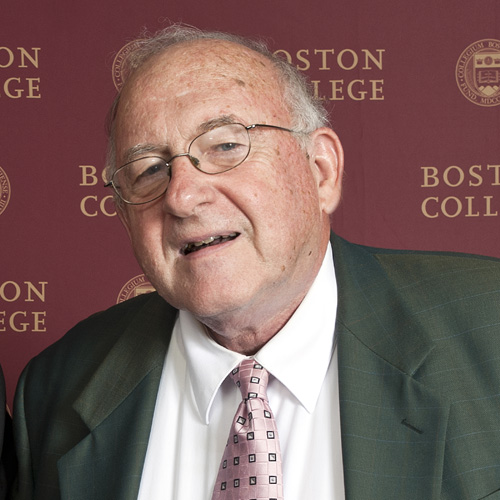In Memoriam: Thomas E. Wangler
Thomas E. Wangler, a retired associate professor of theology who taught at Boston College for 44 years and was active in faculty governance, died on April 24. He was 85.

Thomas E. Wangler (Lee Pellegrini)
Dr. Wangler, who specialized in the history of religion in America and American Catholicism, was director of the Theology Department's Graduate Studies Program. He also served as associate dean for students in the College of Arts and Sciences from 1972-1974.
Among his publications were a pair of articles, both published in Harvard Theological Review, that dealt with Americanism, a modernist, liberal political and religious outlook attributed to some late-19th-century American Catholics that led to conflict within the Catholic Church and was denounced as heresy by the Holy See.
A summary of one Dr. Wangler article, “The Birth of Americanism: Westward the Apocalyptic Candlestick,” explained that “a faith or myth was born alongside the standard Catholic orthodoxy of the period, one which affirmed God as rearranging the world, determining the decline of Europe and the emergence of the United States of America as a ‘New World,’ destined, as in the puritan dream, to shed its influence around the world. The unique features of this American Catholic reinterpretation of the puritan myth were that it was housed within an international religious institution, and its object was not exactly the spread of political liberty or a purified Christianity, but a modernized or Americanized Catholicism.”
“The Birth of Americanism” received an award from the College Theology Society in 1973.
Dr. Wangler also contributed “American Catholics and the Spanish-American War” to the volume Catholics in America: 1776–1976.
Dr. Wangler rode a moped to campus in the 1970s. (Photo: Boston College Colleague, 1977)
A hallmark of Dr. Wangler’s BC career was his participation in faculty governance and other administrative work. Over the years, he served on the Faculty Due Process Committee, Faculty Hearing Committee, Faculty Review Panel, Faculty Compensation Committee, and Faculty Grievance Committee, among others. In addition, he was a member of the A&S Educational Policy Committee, and directed the school’s Scholar of the College Program. He also served on the planning committee for the University’s 125th anniversary celebration in 1988.
Dr. Wangler showed a willingness to broaden his approach to teaching when during the 1992-1993 academic year he participated in a series of seminars on applying the case method—most often associated with management and business education—to disciplines in the liberal arts and humanities. Speaking with Boston College Chronicle, Dr. Wangler said the large number of students in his classes seldom offered an opportunity for a discussion format.
“Consequently, I haven’t developed many skills in leading classroom discussion,” he said. “I thought, however, that it would be a good thing to learn and so far I’ve enjoyed the seminars very much.”
Dr. Wangler occasionally shared his expertise with the media, discussing the first year of then-Archbishop Sean O’Malley, OFM, Cap., as head of the Archdiocese of Boston in an interview with the Associated Press, and commenting on the evolution of Cardinal Bernard Law’s leadership style for a story in the Boston Sunday Globe.
His proficiency as a religious historian was once put to use in an extraordinary circumstance: as an expert witness in the trial of John Salvi, accused of killing two women and wounding five other people in shootings at two Boston area abortion clinics in 1994. Dr. Wangler was called by the defense to reinforce its assertion that Salvi was experiencing paranoid schizophrenic delusions, claiming among other things that Freemasons were running abortion clinics as part of a plot to reduce the number of Catholics, reported The Boston Globe.
Dr. Wangler testified that while the Roman Catholic Church and the Freemasons had been at odds for centuries, there was no conspiracy on the part of the Freemasons toward Catholics.
Dr. Wangler graduated from LeMoyne College in 1960, leaving behind an impressive legacy of eight intercollegiate athletic trophies he won in cross-country; in 1990, he was inducted into LeMoyne’s Gold Wave Athletic Hall of Fame. He received a doctorate in religious history from Marquette University.
He retired from BC in 2011.
Dr. Wangler is survived by his children Julie Anne Belou and John W.
.Wangler; granddaughter Alexandra; three step-grandchildren and seven
step-great-grandchildren; siblings Paul, Ann, Mary, and David. He was
predeceased by his wife, Gail, and sister Joan.
Interment was private.
Memorial contributions can be made in his memory to the Office of Campus Ministry/Newman House, Boston College, McElroy 233, 140 Commonwealth Ave., Chestnut Hill, MA 02467. To send a note of condolence or to share a memory with his family, visit eatonandmackay.com.
